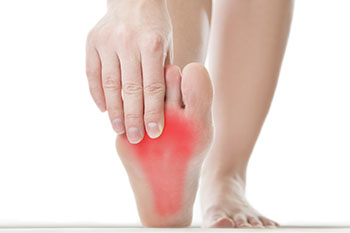Connect With Us
Plantar Fasciitis

Plantar fasciitis is a foot condition that particularly causes a great deal of pain in the heel area. Some patients have described the pain as stabbing and is typically felt in the morning, when first getting out of bed. You may also experience pain with this condition if you stand or sit for long periods of time throughout the day. The development of plantar fasciitis is quite common among runners, those who are overweight, and those who do get enough support from their footwear.
When small tears occur on the fascia, it may become inflamed, especially if too much pressure is put on the tissue. It’s extremely important that you seek professional help as soon as you feel any type of foot pain. If plantar fasciitis is left untreated, there’s a high chance you may develop chronic heel plan. You may also develop other issues connected with your foot, knee, hip, or back, all due to the body walking differently to relieve pain felt from plantar fasciitis.
Despite the common causes of plantar fasciitis, there are many different treatment options. For less severe cases, conservative home remedies such as taking anti-inflammatory drugs to alleviate pain, applying ice packs to the bottom of your foot and heel, slowly stretching and exercising your feet to re-strengthen the tissue, and using orthotic devices to overcome issues such as over-pronation are all ways to help manage your plantar fasciitis.
For more severe cases however, there are still things that can be done. Shockwave therapy has become a common solution for plantar fasciitis because it effectively breaks up the tissue on the bottom of your foot via sound waves which facilitates healing and regeneration, allowing you to overcome the chronic pain caused by plantar fasciitis. Even if this doesn’t work, surgery is always a final option. Surgery on the tissue itself can be done to permanently correct the issue and stop the inflammation and pain in your heels.
Treatment for plantar fasciitis depends on the severity of the specific case of the condition. Ice massage applications may be used to reduce pain and inflammation. Physical therapy is often used to treat plantar fasciitis, and this may include stretching exercises. Another treatment option is anti-inflammatory medication, such as ibuprofen.
Because plantar fasciitis is known to worsen over time, it’s recommended that you contact our doctors at East Ocean Podiatry as soon as possible for a proper diagnosis and advised treatment plan.
